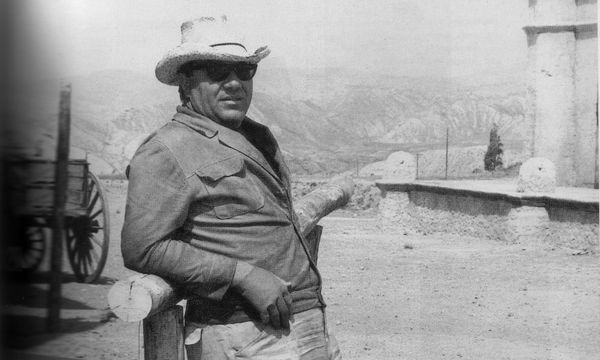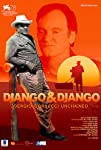Eye For Film >> Movies >> Django & Django (2021) Film Review
Django & Django
Reviewed by: Andrew Robertson

Sergio Corbucci, the other Sergio. If one supposes that Ford is the best American director of Westerns then who is second? It's a dogfight. If one acknowledges Leone as the best Italian director of Westerns then who is second? "It's (fucking) Corbucci".
Director Luca Rea has a few documentaries to his credit, mostly under an hour and for television. One, Liberi Tutti, explores the chaos of private television broadcasters in Italy in the 1970s, there's one on teatro canzone pioneer Giorgio Gaber and one on Aldo Moro, Italy's ill-fated 38th prime minister. At about 80 minutes, and even then with pacing issues, this feels like an hour of TV that has been padded.
There's an extended sequence of behind the scenes footage of the stunt set-pieces in Corbucci's What Am I Doing In The Middle Of A Revolution?, which is interesting enough but it's presented without comment. A stark contrast to other parts of the film which are almost exclusively so.
Context isn't always given, but it's often nice to hear compositions Quentin Tarantino has borrowed in their original framings. Some of the archive film is shown as if the projector is improperly gated, echoes of it above and below the frame within the frame. That imposition of artefact makes it clear that it's film, but seems to share more with the padding that goes around mobile phone footage shot in portrait.
Though among the archive there's plenty of interview, including with the late Corbucci, it's the new questions that provide interest. Franco Nero (the original Django) is still bright eyed and compelling. Ruggero Deodato (Cannibal Holocaust) had a similar career trajectory. It's Tarantino who is central, however, and the quirks of his appearance are one of the film's strengths.
There are seven 'chapters' to the film, but there's a prologue and an epilogue too. The former is a sequence not in Once Upon A Time In Hollywood, though it may now be in the novelisation. It's a dinner between Rick and Corbucci, a comedy of manners almost as the star of Hollywood TV Oaters is wined and dined in the hope of getting work in a Spaghetti Western. With painted scenes, partially animated, instead of storyboards it's got an artificiality that wraps around metatext to create a historical background. There's footage of the Pan-Am jet, a model I believe, and I was minded of my delight when I discovered that in Once Upon... the trailer park and drive-in where Rusty stays was a miniature.
The magic of movies, and all that. Thumbs up, and, sometimes, off. In a polyglot production, where there's Italian, English, and archival French, big Quentin gets the chance to ramble on. I say that kindly, it does not feel scripted, more that it's been rearranged in the edit. This includes a discussion in the credits that amounts to Tarantino's fan-theory about something in Django. It's a credible one, and it is worth remembering that however lofty his successes and meandering his own films, he started as a fan himself. The seven chapters feel like they might have been imposed in the edit, rather than (Tarantino especially) following a fixed thesis or outline.
Corbucci's influence on Tarantino can be seen, heard - as can his passion. The film discusses perhaps a baker's dozen of Corbucci's work, roughly a fifth of his directorial work. There's mention of him moving on to other projects, but this is less about him than about Tarantino's appreciation thereof. That's not to say it doesn't work. Alex Cox's book 10,000 Ways To Die is his meditation on the Spaghetti Western. Corbucci, naturally, features heavily. This feels much the same, it's a director on another director. Or rather it's the director of Django Unchained and Once Upon A Time In Hollywood on the director of a fistful of cowboy movies and a couple of films in the Roman (and Romulan) era.
Discussion of Corbucci's pro- and an- tagonists is interesting, hero and anti-hero don't achieve the same synthesis. There's a suggestion that his villains were modelled not only on Mussolini but Manson, and that interpretation is given credibility by the light Tarantino casts upon it. The insight into the realities of Spaghetti Western production are interesting too. 150 films a year! There's a story of horses wandering off from one set to the next film, though they don't speculate as to whether it was to visit friends or take advantage of a better class of hay at craft services.
Though clearly affectionate, and with some interesting insights, this does not feel as if it stands on its own. In a box set of Corbucci's Westerns this (by any criterion) would be a high quality DVD extra, but unless you are already a fan watching Tarantino shoot the breeze about Corbucci will not blow you away.
Reviewed on: 10 Sep 2021
















